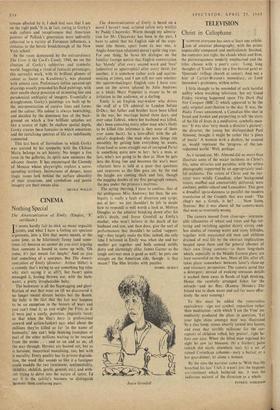CINEMA Nothing Special
The Americanization of Emily. (Empire, ' X' certificate.)
T r seems hardly fair to stick so many arguable 'points, and what I have a feeling are specious arguments, into a film that seems meant, at the same time, to be hilariously funny (and some- times is); because no sooner do you start arguing than someone is bound to come up with, 'Oh come, it's just meant for laughs.' And so you feel something of a sourpuss. But The Ameri- canization of Emily (director: Arthur Hiller) is a comedy that's trying to say something big (else why start saying it at all?), but hasn't quite managed it, having thrown out, with the bath- water, a pretty irreplaceable baby.
The bathwater is all the flagwagging and glori- fication of war that went on till we discovered it no longer meant distant battles but the Bomb; the baby is the fact that the last war happens to be an exception in the history of wars and you can't treat it, as you might the First, as if it were just a costly, pointless, jingoistic farce; so that when the film's hero (a professional coward and action-funker) says what about the millions they've killed so far 'in the name of humanity,' one can't help thinking (sourpuss or not) of the other millions waiting to be rescued from the ovens . . . and so on and so on, all the way through. Heroics are booted out, but so is heroism; theoretical moralising, too, but with it morality. Every quality has its private degrada- tion, the word that sounds so like it a foreigner could muddle the two (sentiment, sentimentality, childlike, childish, gentle, genteel, etc.), and with- out trying to delve into the nature of satire, I'd say it is the satirist's business to distinguish between these confusing pairs.
The Americanization of Emily is based on a novel I haven't read, scripted (often very wittily) by Paddy Chayevsky. Warm though my admira- tion for Mr. Chayevsky has been in the past, I have to admit that his English side of the argu- ment (the theme, apart from its war one, is Anglo-American relations) doesn't quite ring true. For one thing, he bases his dialogue on the familiar foreign notion that English conversation has 'bloody' after every second word and 'love' (adjectival or apostrophic) after every third; for another, it is somehow rather arch and squirm- making at times, and I am still not sure whether the squirm-makingest English rose I have ever seen on the screen (played by Julie Andrews as a khaki Mary Poppins) is meant to be an irritation to the audience, or a darling.
Emily is an English war-widow who drives the staff of a US admiral in London before D-Day; her father and brother have been killed in the war, her marriage lasted three days, and ever since Tobruk, where her husband was killed, she's been consoling every other man who's likely to be killed (the inference is they none of them ever came back). So a love-affair with the ad- miral's dogsbody (the man who sees things run smoothly by getting him everything he wants, from food to scent straight out of occupied Paris) is something quite new to her: he's a man, at last, who's not going to be shot at. How he gets into the firing line and becomes the war's most reluctant hero is told at a pace that quickens and improves as the film goes on; by the end the laughs are coming thick and fast, though the nagging doubts of my first paragraph remain, the pea under the princess's mattress.
The acting (barring; I have to confess, that of the ambiguous Miss Andrews; but then, the am- biguity is really a fault of direction and script, not of her: we just shouldn't be left in doubt how to respond) is well worth a look at. Melvyn Douglas as the admiral breaking down after his wife's death, and Joyce Grenfell as Emily's mother, who won't believe in the death of her husband and son, and then does, give the sort of performances that shouldn't be called 'support- ing'—they largely make the film; indeed, the only time I believed in Emily was when she and her mother got together and both seemed mildly dotty and alarmingly alike. James Garner as the tough anti-war man is good as well: he puts one straight on the American side, though: is that meant? The film bristles with puzzles.
ISABEL QUIGLY
Joyce Grenfell






























 Previous page
Previous page